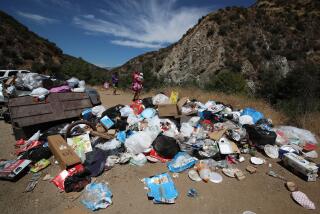Stewards of scenic area try to keep it that way
- Share via
BOLTON, N.Y. — Two miles past the lean-to and privy atop Fifth Peak and the stellar views of Lake George, the trail winds through woods, around crags and up to a grassy bluff with an even more stunning vista.
Atop French Point Mountain, you can see the long, crooked expanse of blue-black water 1,500 feet below for almost 10 miles north and south. With lush forests in the steep foreground and dappled green mountains along the horizon, the 180-degree panorama stretches beyond the lens of any ordinary camera. On a lazy afternoon, the unobstructed southwest wind dries sweat and blows off the black flies.
The Lake George Wild Forest is one of the busiest backcountry getaways in New York’s Adirondack Mountains, where summer problems range from loud beer parties to parking overflow. To keep the forest wild, environmental stewards must assiduously manage the human impact or risk destroying the very beauty that lures more than 25,000 register-signing visitors each year.
Standing at the French Point cliff edge, looking past the narrow track that winds among sparse scrubby hardwoods and down to a quiet bay, one takes in a scene reminiscent of Homer’s Odyssey. A distant motorboat snakes among the islands, its wake only a slow-moving white dot, its engine a faint, irrelevant buzz.
The farther into the wilderness you go, the better it often gets. The crowds thin out, and you can escape the trappings of civilization and find yourself lost in 71,133 acres. No stress. No concrete.
But solitude is not the only appeal of the wilderness. Families and groups of friends come to hike, rewarded with the vistas from the lakeside Tongue Mountain Range, including Fifth Peak and French Point.
Couples camp under backcountry lean-tos or pitch a tent in even more remote spots. Others come to swim, kayak, fish, picnic and breathe evergreen-scented air.
This wilderness is just 65 miles north of Albany, but keeping it pristine takes work. The collection of state-owned parcels that form the Lake George Wild Forest more or less rim the 32-mile-long lake, which also has thousands of second homes, camps, boats and a popular tourist village on its shores that draw many visitors from downstate.
The state Department of Environmental Conservation, or DEC, has proposed a new management plan to smooth out some stresses -- for example, to curb underage drinking parties at the camping areas along the Hudson River farther west and in the Shelving Rock area by the eastern lakeshore.
Both are near roads, along water and were once infrequently patrolled.
The state agency closed the most popular part of the Shelving Rock area to camping, moved other campsites farther from the road and spread them out, and in the process helped reduce erosion, vegetation loss, sanitation issues and the “numerous complaints.” The agency wants to take similar steps along the Hudson and codify restrictions on camping that rangers can take to court.
Snowmobiles, allowed in several other parts of the forest, are prohibited in the Tongue range with its 25 miles of trails and six summits on a peninsula jutting into Lake George. All-terrain vehicles, however, are banned here, as they are from most state land in the Adirondacks.
New York’s Forest Preserve constitutes half the 6-million-acre Adirondack Park, and visitors can camp almost anywhere that’s at least 150 feet from a road, trail, lake or stream.
At some trailheads, the main issue is parking spaces, with peak overflows that sometimes leave vehicles parked along the narrow, winding, two-lane highways.
The DEC is considering turning the unpaved overflow area at Clay Meadow, for example, into a bigger lot, and linking it with a footpath into the Lake George forest.
From Clay Meadow, it’s a 2.6-mile hike past a waterfall and up to Fifth Peak, which DEC forester Mike Curley says draws most visitors in late summer and early fall. From here, hikers can see a large swath of Lake George from one lookout and Northwest Bay, an arm of the lake, from another.
More to Read
Sign up for The Wild
We’ll help you find the best places to hike, bike and run, as well as the perfect silent spots for meditation and yoga.
You may occasionally receive promotional content from the Los Angeles Times.






